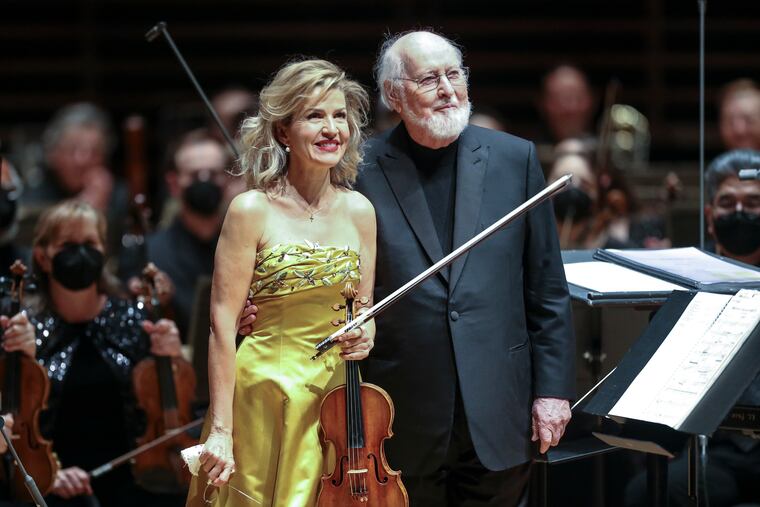Star Wars and a new concerto: John Williams conducts his own music with the Philadelphia Orchestra
Violinist Anne-Sophie Mutter was astonishing performing Williams's film music and his new violin concerto.

Young couples. Sixty-something women in gowns. Star Wars fans in sandals.
Parsing Tuesday night’s sold-out Philadelphia Orchestra audience in Verizon Hall, you had to marvel at the diversity — or at least the generational spread — that is rare at orchestra concerts. Everyone arrived on this unusual night by way of a different route, but the multiple spontaneous standing ovations suggested they all got what they came for: John Williams.
In a two-hour program, the composer and conductor, seemingly undiminished by his 90 years, led the orchestra through the expected lands of Harry Potter and E.T., and also into the new territory of his Violin Concerto No. 2.
Nostalgia was obviously a powerful pull for those who bought a ticket to recapture the feeling of a long time ago in a galaxy far, far away — as in, your childhood movie theater, c. 1977. But there was a tantalizing intermingling of forces in the air Tuesday night. Maybe those who came for the Star Wars heard something of Williams’ film scores in the violin concerto? And is it possible that anyone who looked down on a film composer in the concert hall might have thought differently after hearing Anne-Sophie Mutter in one idealized version of a Williams score after another? The German violinist appeared not just in the concerto, but was a presence all night. An astonishing musician, she.
Tuesday night’s concert was a benefit for the orchestra and Academy of Music, and some patrons had attended preconcert receptions and a dinner. Thursday night’s repeat at Carnegie Hall is also a benefit, for Carnegie’s education and artistic programs. Williams and Mutter have been working together for several years, and whatever collaborative synergy they may have it was clearly Mutter’s singular qualities that made the evening work.
I never thought much of the Theme from Schindler’s List — it sets off my schmaltz alarm when it comes on the radio. Here, though, played by this ensemble, in this lush orchestration, it cozied up to the throatiest part of the ensemble’s sound spectrum. Mutter has the most precise and nuanced command of inflections — dozens of small changes in bow speed and pressure in one hand and arm, and agile finger moves in the other. She can (as Williams told the audience at one point) play anything. More important, she plays it at an extremely high level of command that produces the sensation that every note has a life of its own.
Strangely, perhaps, I found myself missing the movie screen in a series of selections from Williams’ film scores. “Flight to Neverland” from Hook is loud and proud, but it isn’t the composer’s best work, and there isn’t enough to interest the ear without something for the eye. Excerpts from Close Encounters of the Third Kind were wonderful as always with a Straussian expansiveness that fills your chest with excitement. “Throne Room” and “Finale” from Star Wars Episode IV: A New Hope reminded us of Williams as heir to composers from Rimsky to Elgar.
Mutter — donning a golden, strapless vintage Dior gown for the night — was soloist in an arrangement of “Hedwig’s Theme” from Harry Potter, her non-vibrato sound ghostly in its perfection. She brought smoke and melancholy to the Theme from Cinderella Liberty and cute, swashbuckling fun to “The Duel” from The Adventures of Tintin.
Williams wrote his Violin Concerto No. 2 in 2021 and 2022, and it is dedicated to Mutter. Composers often talk about writing with the specific characteristics of a particular player in mind. Here, though, it seems more than an empty cliché. In the long-ish work (four movements, 35 minutes), Williams repeatedly writes to her great strengths. The orchestration is often diaphanous, with brooding low strings and a pinpoint harp (played by Elizabeth Hainen seated near the front of the orchestra), producing a gentle scrim against which Mutter’s warm sound glows. The violinist has a particularly affecting way of expressing breathy emotion, a characteristic Williams exploited wonderfully.
Yes, there are lots of influences in the score (Korngold, Mahler, and Walton), but the overall weave adds up to a true original. Not many works can sustain light mist and dark shadows as long as this one does. Fewer still do it so absorbingly.
Where is the light, the sense of triumph and optimism, for which Williams is known? You do get a major chord at the end. But it’s quiet and brief, and it’s so lacking in vehemence you wonder whether the composer means it. Here, the good guy doesn’t win with a flourish at the end. For that we’ll always have the movies.